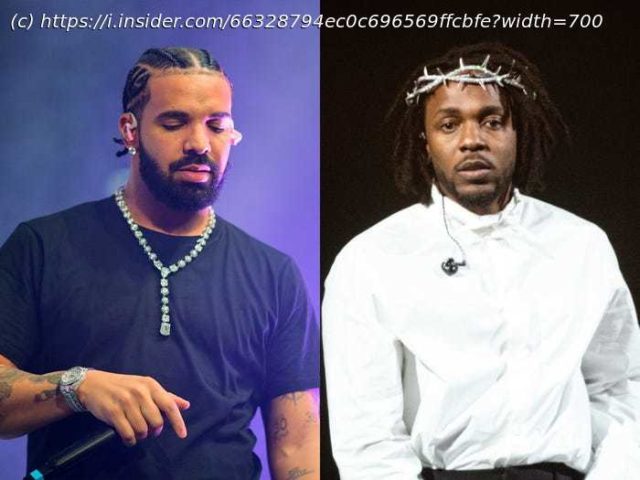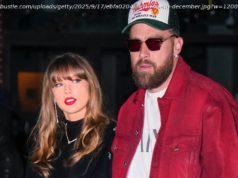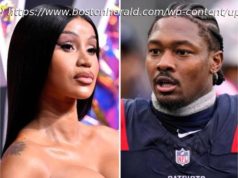Kendrick Lamar surprise-released his latest album, «GNX,» extending his victory lap in the rapper’s feud with Drake.
Drake and Kendrick Lamar were once considered collaborators, perhaps even friends.
Both rappers lent features to the other’s 2011 albums («Take Care» and «good kid, m.A.A.d city», respectively) and even teamed up with A$AP Rocky for the 2012 hit «F**kin’ Problems.»
Over the years, however, Drake and Lamar came to represent very different versions of hip-hop greatness: the former is a commercial juggernaut, racking up No. 1 albums and breaking chart records set by The Beatles, while the latter is a Grammy darling and acclaimed lyricist who’s won a Pulitzer Prize.
Today, their separation is more apparent than ever: Drake and Lamar have become all-out foes.
In March, the Compton rapper used one simple line to reheat their long-simmering beef: «Motherfuck the big three, it’s just big me.»
The avowal appeared in Lamar’s guest verse for «Like That», the sixth track on Future and Metro Boomin’s collaborative album «We Don’t Trust You.»
When the album was released, attentive rap fans noted Lamar’s sneaky reference to J. Cole’s guest verse in the 2023 Drake hit «First Person Shooter.»
«Love when they argue the hardest MC / Is it K-Dot? Is it Aubrey? Or me? / We the big three like we started a league», Cole rapped, referencing Lamar’s nickname «K-Dot» and Drake’s birth name, Aubrey Graham.
While Cole backed down from the challenge, Drake did not. He released a pair of diss tracks aimed at Lamar, «Push Ups» and «Taylor Made Freestyle.»
In the former, Drake mocks Lamar’s height with a reference to his latest Grammy-winning album, «Mr. Morale & the Big Steppers.» («How the fuck you big steppin’ with a size-seven men’s on?») The latter track opens with AI-generated advice from Tupac Shakur, whom Lamar has frequently been compared to. This strategy backfired, drawing criticism and legal threats from Shakur’s estate; Drake removed the song from his social media.
Lamar finally responded after 11 days of silence, dropping an explicitly anti-Drake diss called «Euphoria.»
The song contains layered insults about his rival’s roots («I’d rather do that than let a Canadian n**** make Pac turn in his grave»), Drake’s track record as a dad («I got a son to raise, but I can see you don’t know nothin’ ’bout that»), and long-stewing plastic surgery rumors («Tell ’em where you get your abs from»).
Even the title is likely a reference to Drake’s role as executive producer on HBO’s «Euphoria», a show that’s been criticized for objectifying and sexualizing young girls. (None of the actors depicted having sex are actually teenagers.)
The drama didn’t stop there. Less than 72 hours later, Lamar released «6:16 in LA», which sparked another response from Drake («Family Matters»), which provoked two more jabs from Lamar («Meet the Grahams» and «Not Like Us»), which finally led Drake to address criticism head-on («The Heart Part 6»).
As of writing, the rappers have exchanged a total of nine diss tracks (including «Like That») in a matter of weeks. It’s the latest in a long, storied history of rap feuds, but even so, there’s a lot to unpack here.
We broke down the key takeaways from hip-hop writers and culture critics.After ‘Euphoria’, critics said Lamar took round one
The unbridled energy of «Euphoria» has been widely praised by critics, even though Lamar’s rebuttal came later than fans expected.
«Drake’s ‘Push Ups’ and ‘Taylor Made Freestyle’ were solid efforts, but for my money, they didn’t hit as hard as the ‘Like That’ verse or ‘Euphoria'», Angel Diaz wrote for Billboard. «This response was well worth the wait.»
Similarly, music journalist Sowmya Krishnamurthy commended Lamar’s patience, writing on Medium, «There’s a reason that he’s known as hip-hop’s reigning boogeyman.»
«What’s so great about ‘Euphoria’ is that it’s six minutes and 24 seconds of rapping. Straight bars», Krishnamurthy wrote, comparing Lamar’s «vicious» lyrical skill to Drake’s «penchant for social media trolling and gimmicks.»
«This is a rap battle», Krishnamurthy added. «The victor needs to showcase actual skill, wit, wordplay, and flow in order to take it.»
In a track review for Pitchfork, Alphonse Pierre argued that Lamar’s humor and passionate delivery help to sell the song — despite its underwhelming production and its lack of a «knockout blow.»
«He sounds like he’s been waiting years for this moment. ‘I hate the way that you walk, the way that you talk / I hate the way that you dress’, he raps; cliché, but it works because he sounds like he really means it», Pierre wrote.Lamar declared, ‘I’m the biggest hater’, and people are loving it
Drake is no stranger to diss tracks. Back in 2018, he was eviscerated by Pusha T’s «The Story of Adidon», which Pierre said «set the bar for all future Drake teardowns.»
Pusha T promoted the release with an old photo of Drake in blackface. In the song, he revealed that Drake had quietly fathered a child with an adult film star.
By contrast, «Euphoria» isn’t especially specific or revelatory. Instead, what delighted critics is the sheer level of contempt that Lamar has been harboring for the Canadian chart-topper.
«This ain’t been about critics, not about gimmicks, not about who the greatest / It’s always been about love and hate, now let me say I’m the biggest hater», Lamar raps.
The lyric is probably a reference to a Breakfast Club interview with DMX in 2012 in which the rapper declared, «I don’t like anything about Drake. I don’t like his fucking voice. I don’t like the shit he talks about. I don’t like his face. I don’t like the way he walks, nothing.»
Pop culture writer Hunter Harris applauded Lamar’s catty «war cry» in her newsletter «Hung Up», noting, «The meanest thing you can possibly do is to hate someone just because.»
Zoe Guy echoed this sentiment in an article for Vulture, saluting Lamar for his «blatant honesty.»
«We can only hope Lamar never relinquishes the hate in his heart, because we could go for another fiery verse or two», Guy wrote.
Music journalist Andre Gee agreed, contending that Lamar didn’t need a big reveal or accusation for the song to land — he only needed to be energized by his own personal disdain.
Домой
United States
USA — Music Who's winning the Drake vs. Kendrick Lamar showdown? The Compton rapper extended...






